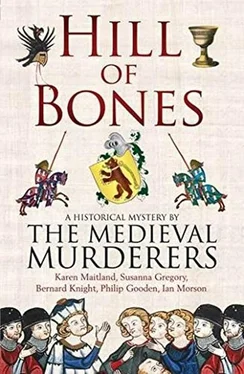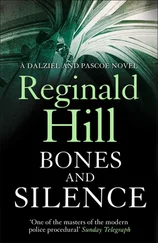As usual, the cellarer was keen to deride the sacrist’s opinion.
‘Brother Hubert, you need not include “whoever was the thief” in your speeches. We all know it was Eldred, may God curse him!’
‘I rather thought that the Almighty was the fount of forgiveness,’ retorted Hubert in his mild voice. ‘And I still need some proof before I am satisfied that my assistant is guilty of this crime.’
Brother Gilbert muttered, ‘Then you are an old fool!’ under his breath, but the prior brought them to order.
‘It is useless for us to bicker over this matter, brothers. We have searched the abbey time and again with no result, so we have no option but to leave it to the sheriff and his men.’
The cellarer was determined to have the last word. ‘I still suspect that royal steward had a hand in this, somehow. The damned man was too thick with Eldred. I’ve seen them together many times.’ He glowered around at his colleagues. ‘If I was the sheriff, I’d put him to the torture, King’s man or not!’
Up on Solsbury Hill, Eldred decided to explore a little. He had spent an uncomfortable night in his rocky cleft, but now that the day had improved, he felt the need to stretch his legs. Though he was still nervous about meeting others on the hill, whether human or fiendish, he urgently needed a change from the constriction of the rock face. Leaving his blankets hidden under some fern fronds in his sleeping place, he moved sideways to regain the trees and clambered up from them onto a grassy bank. A deep groove ran beyond this, a long-overgrown ditch the height of a man, which ran almost entirely around the top of the hill, which was a flat, rounded triangle.
The inner bank of the ditch was steep and rose higher than his head, but some yards to his left there was a break in the rampart, with a gap that went through at an angle to give easier access to the enclosure, a couple of acres of weedy grass. He knew from years of listening to gossip and old men’s tales, that in ancient times this had been a fortress with a stockade all around it. There were many lurid theories as to who once lived up here, varying from a race of giants to the Roman legions, but today it was deserted as Eldred ventured warily through the gap on to the small plain. The sun was shining intermittently between the scudding clouds and in the brightness of an autumn afternoon, he felt more confident about being on this hill, which had such a mystical and often threatening reputation. There was a striking view, especially to the south and west, and he could see the tower of the abbey church and the city walls alongside the silver streak of the Avon, as it ran at the foot of the many hills that surrounded Bath.
His eyes misted as he wondered if he would ever see his wife and the familiar things of his everyday life back in the city. Unless his two staunch friends could discover who had stolen the abbey’s treasures, he would become a hunted outlaw, cut off from God and man for the rest of his miserable life. Overcome by grief and self-pity, he sank on to the grass and began to sob.
After a few moments, Eldred pulled himself together and wiped his eyes with the sleeve of his tunic. He had abandoned his lay brother’s brown cassock for this exile in the countryside, and wore instead the thigh-length belted tunic and worsted breeches that were the usual garb of the commoner.
Squatting there in the sunshine, he plucked a grassy stem and chewed it ruminatively, staring unseeingly at the distant view as he tried to make sense of the catastrophe that had so suddenly disrupted his ordered life. He fully realised that he’d had to take the blame for the theft merely because he was the nearest and most convenient scapegoat, rather than that he was the target of some foul conspiracy. But who could possibly be the true culprits?
The abbey was a tightly knit community, full of petty squabbles and jealousies, for all that the religious life was supposed to be a haven of peace, tranquillity and benign tolerance. Monks and their acolytes had the same emotions and faults as men anywhere, saints being very few and far between. Many were there because their families had pushed them into the life as children, others were escaping from problems with their personal affairs – and others merely sought advancement in the ecclesiastical hierarchy, often linked to secular politics, the prime example being the ambitious Bishop Savaric.
But who had stolen the chalice and the pyx, agonised Eldred. Was it someone from outside or was it an inhabitant of the abbey? And if the latter, was it a lay brother or a monk? But what would a monk, many of whom were ordained priests, want with gold and silver?
Eldred immediately realised that that was a stupid question, as many of the higher ranks of the clergy were amongst the richest men in England – and rich men often coveted even more wealth. However, he could hardly credit that the bishop or the prior were likely to have stolen treasures from their own church.
As he sat looking over the rolling hills of Somerset, he could not help thinking of those he disliked most in the abbey. Though a mild-natured fellow, like all men Eldred had those whose company he preferred to avoid. His immediate master, the sacrist Hubert, was a miserable, carping man, but had never caused him any serious trouble, and indeed, had been the only Chapter member to express doubts about Eldred’s guilt.
He thought of Prior Robert as a ‘whited sepulchre’, as the Bible had it, for his permanent affability and ostentatious devoutness was a sham, but he was an unlikely robber. This applied also to the mean-minded precentor, Brother Seymour, whose Spartan existence suggested that he would not know how to spend gold even if he had any. The treasurer, Thomas de Granville, was an unknown quantity to Eldred, a silent, rather sinister character who spoke rarely and then only in French or Latin, as he had never bothered to learn English since coming from an abbey in Normandy.
Time and again, Eldred’s mind came back to the cellarer. Brother Gilbert was a bluff, worldly man who had been a soldier and then a cloth merchant before taking the vows of a Benedictine a dozen years ago. As with so many monks, some of whom had something to hide in their past, little was known of his previous life except that he was originally a Bristol man. He had gained the post of cellarer because of his previous experience of commerce. Certainly his efficiency in running the complex business of feeding and housing the abbey community was notable, exceeding his enthusiasm for devotional duties, which he often evaded with the excuse that he had to attend to some urgent matter in his stores. Eldred had not a shred of evidence that Gilbert might be involved in the theft, but his personal antipathy to the man’s abrasive character and contemptuous manner made him a possible candidate in the lay brother’s mind.
A cloud passed over the sun and a sudden cold breeze brought Eldred out of his reverie, so he rose and began walking around the inside of the ditch, eating the last of his bread and cheese, which he had saved in the pouch on his belt. He felt a sudden overwhelming loneliness and yearned for the next morning, when he would go down to the track to meet Riocas and, he hoped, learn some good news that would end his exile in this strange place.
Riocas and Selwyn were endeavouring to find that good news for their lonely friend when they met again in the fur-trader’s shop late that afternoon. The steward would have preferred to have used his royal kitchen for their discussion, as the pervading smell of partly cured animal pelts was not particularly pleasant, but he realised that if Riocas was seen to be visiting him too often in the abbey enclave, it might arouse suspicion about who might have been responsible for Eldred’s escape.
Читать дальше












